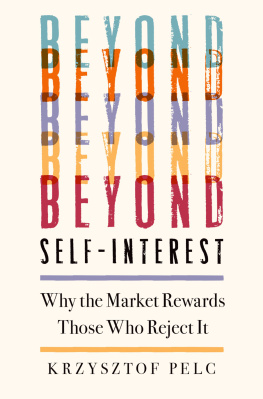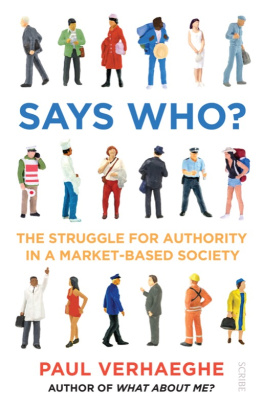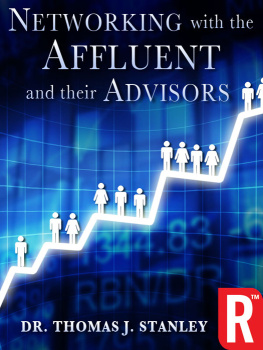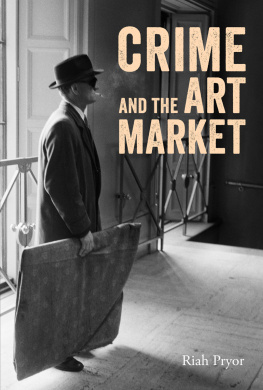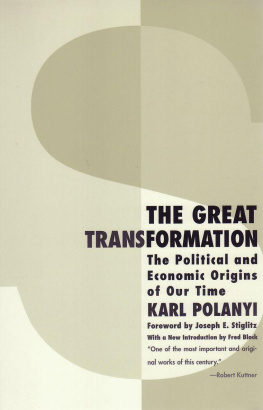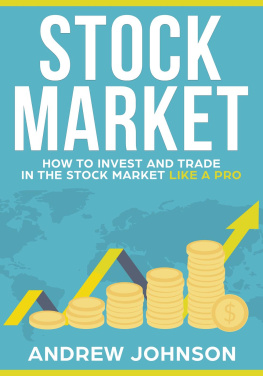Beyond Self-Interest


Oxford University Press is a department of the University of Oxford. It furthers the Universitys objective of excellence in research, scholarship, and education by publishing worldwide. Oxford is a registered trade mark of Oxford University Press in the UK and certain other countries.
Published in the United States of America by Oxford University Press
198 Madison Avenue, New York, NY 10016, United States of America.
Krzysztof Pelc 2022
All rights reserved. No part of this publication may be reproduced, stored in a retrieval system, or transmitted, in any form or by any means, without the prior permission in writing of Oxford University Press, or as expressly permitted by law, by license, or under terms agreed with the appropriate reproduction rights organization. Inquiries concerning reproduction outside the scope of the above should be sent to the Rights Department, Oxford University Press, at the address above.
You must not circulate this work in any other form and you must impose this same condition on any acquirer.
CIP data is on file at the Library of Congress
ISBN 9780197620939
eISBN 9780197620953
For Elza, to the conversions and insurrections to come.
Table of Contents

A Recurrent Paradox
Success in Circuit lies.
EMILY DICKINSON
The pursuit of self-interest makes the world go round. This is the standard story we tell ourselves, most often with a sigh of resignation. Self-interest has brought about a society of greed and naked ambition. Faced with an increasingly competitive economy, we have no choice but to vie for an edge at our neighbors expense. The causes are structural, technological, and outside our control: foreign competition, rising automation, looming uncertainty. We feel this pressure as individuals, too: in this cut-throat marketplace, we must curate our personal brand, polish our rsums, and prepare our children to do the same. We bemoan how instrumental our attitude has becomehow everything we do, we do to get ahead, rather than for its own sake. We blame the internet, the rise of social media, the devices in our pockets, all of which have hijacked our self-interested reflexes to purposes not our own.
That same story was once told triumphantly. As 18th-century Enlightenment thinkers saw it, the pursuit of self-interest was the magic social glue that led strangers to serve one anothers needs. It was the essential building block of civilization. If we could count on getting our daily bread, it was because a self-interested farmer sold wheat to a self-interested miller, who delivered flour to the self-interested baker who made us our sourdough.
These seemingly opposite accounts share a basic premise, namely that self-interest is the undisputed driver of human behavior in modern market societies. Those who want to do well are advised to toe the line: to set their goals, arm themselves with strong will, and work relentlessly toward reaching them. According to which of the two accounts we choose to believe, the effects of self-interest are either socially beneficial or socially destructive. But neither story departs from the shared belief that markets reward individually rational, self-seeking actions. It is this unquestionable premise that I want to question in this book.
I want to suggest instead that the true idols of our market-driven age are its most committed dissidents. That the market actually celebrates those who openly flout market rules: the producers who pooh-pooh productivity; the makers who disdain efficiency and economies of scale; the workers who shun work and profess instead to be pursuing their passion. Those who opt out, those who give up on the rat race, those who downsize rather than expandto follow their whim, their calling, their true nature. In a world given over to interest, the disinterested passionates are the ones we can trust.
Actions that appear disinterested often bear more fruit than those that come across as self-interested. Unintended effects are often more potent by virtue of being unintended. As a result, the most compelling force driving todays affluent market societies is not the pursuit of self-interest, but its opposite. Increasingly, those who prosper do so by spurning prosperity. Or better yet, by convincing others that they are pursuing purpose, passion, love of craftanything, in fact, but their own self-advancement. There are limits to the returns of calculation, planning, and resolve, and in a growing number of instances, these limits have been reached. Increasingly, in the age of self-interest, the world belongs to the credibly disinterested.
Consider what strange sounds we hear market actors making above the apparently dominant din of self-interest. Hear the company founders who vow, We dont do [it] for money. We get the biggest investors emailing us every day, but we say no. A guy in a tie tells you what to do... the business becomes like a machine. Or the investors who claim to be more interested in passionate founders than in balance sheets. Or look at the polls that tell us millennials choosing careers are looking for meaning, not money and that they value purpose over paycheck. Or consider the consumers who swear that what they really want is to feel a connection to the people who made their chair, designed their dress, baked their bread. They want chairs, dresses, and bread made with passion, and theyre willing to pay premium for it.
Doesnt this sound like market heresy? Shouldnt CEOs be in it precisely for the money? Shouldnt they be single-mindedly focused on expanding their business, for their shareholders sake and their own? And shouldnt workers provide their labor only on the condition of getting paid as high wages as possible? What about consumers: Shouldnt they seek the highest quality goods at the lowest price, and to hell with their makers intentions?
One might think that a capitalist society would rush to condemn anyone who questions its iron logic. That those who dare flout its rules would swiftly fall by the wayside, ground up by the steady advance of economic progress. Yet these market dissidents never quite manage to become outcasts. Somehow, just the opposite happens: the dissidents are embraced by the very market they claim to be shunning. Pitching their passion against ruthless market forces is flattering to the passionates, who can portray themselves as fighting nobly against an unbending capitalist machine. But the truth is more complicatedand far more interesting.
Declaring passion over profit has become a profitable move. The company founder above, sneering at money and investors, was being quoted in the Financial Times, in an article that concluded: The way to build a globally successful [brand], it seems, is to not really try to build one at all. The same esteemed publication informs its readers that todays consumers want committed brands with authentic products... and if possible small, as small as you can. As the consulting firm McKinsey advised the worlds corporate giants in a recent report, while the conventional wisdom has always been that in the long run Goliaths beat Davids, the times have changed: These days [scale] does not in itself guarantee consumer appealso Goliaths need to find their inner David. What the McKinsey report omitted to say is how fraught this exercise is: the Goliaths impersonations had better be convincing, because the market swiftly punishes any hint of misrepresentation.

